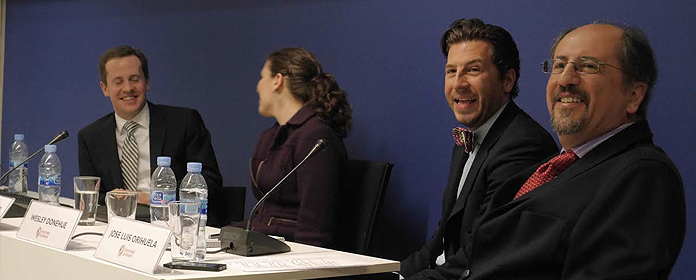Digital Campaigns: Nine Digital Lessons for Winning at the Polls
Three professionals of the political consultancy service were given quotation in Madrid, in a seminar organized by The George Washington University and the School of Communication.

The Internet offers almost infinite possibilities when it comes to designing, planning and executing electoral campaigns. But it is a terrain yet to be explored. It has only been 10 years since Howard Dean attempted an assault on the Democratic primaries from a platform organized around the network, and today the practitioners of political consultancy service are still experimenting -test and error - to try to harness the full potential of digital tools.
Three of these professionals have just visited Madrid to participate in the seminar Digital Strategies for Political Campaignsorganized by The George Washington University and the School of Communication of the University of Navarra. After almost nine hours of conferences, debates and exercises, these are some of the lessons learned:
-
Reinforce more than convert. If in offline life it is already difficult to convince someone who does not share your opinions, in the online universe it is almost impossible. "Digital tools are mostly useful for communicating with your supporters and securing their support, but not so much for persuading those who don't yet support you," says Amelia Showalter, director of digital analytics for Barack Obama's 2012 campaign.
-
Human Resources. A presidential campaign can be a gigantic business . Showalter gives some scary numbers: Obama's digital team hovered around 200 people, including 18 dedicated exclusively to writing e-mails, 4 to manage social networks, 15 digital analysts, another 15 to create and publish online ads, some 15 to 20 to maintain and update the website, etc. "But that was the perfect world," qualifies Wesley Donehue, consultant Republican and founder of Push Digital. "The Obama campaign is the only one that has had those numbers. I've run campaigns with five people, so it's best to be realistic and not compare yourself to Obama."
-
The slow ones lose. "Speed kills," says David Payne, also a Republican and vice president of VOX Global. "In campaigning, it's critical to be fast, to react before your opponent and to seize any opportunity in a matter of seconds." An example: when a media outlet releases a news story damaging to your candidate, it's time to mobilize your most loyal followers to counter the information. "The story doesn't end when the news is published. You have to fight the comment battle and fight it fast," advises Payne.
-
TV goes down, network goes up. The times when TV commercials dominated election campaigns are being left behind. "Today they reach less than 50% of the audience interested in politics. People are either skipping advertising or they're looking at other things," Payne explains. In contrast, "online ads now reach 150-190 million Americans," or the vast majority of voting citizens.
-
Divide and conquer. The Internet makes it possible to segment audiences with great precision -by age, gender, ideology...- and to show them ads relevant to their interests. Payne sums it up with a weapons metaphor: "Television is a shotgun that shoots everywhere and only hits sometimes. Digital is a sniper rifle".
-
Take care of your website. You have to be on social networks, but without forgetting your own media. Payne warns: "No matter how much everyone else is on Facebook, Twitter, etc., you must have a website. Otherwise, from a digital point of view, you're homeless.
-
E-mail is not dead. No one guarantees that in a few years we will still be sending e-mails to each other as we do now, but today it is still a "very important" tool , says the vice president of VOX Global. But he also warns: "Don't abuse it. Some of your followers may only want to receive one e-mail a month. And he offers some interesting data : "Of average, only 26-27% open an e-mail with political content and 2.5% click. But it's also true that only 0.15% give leave".
-
Language matters. "When writing to your followers, don't rely on instinct. It's critical to test different copy to see what works best," recommends Democrat Showalter. As a curiosity, the e-mail that helped raise the most funds for Obama was one that mentioned the recipient in the subject line, so that he or she had the impression that the president was writing to them personally.
-
Be yourself. Politicians sometimes use social media as a one-way medium: they throw out their messages and ignore the responses, as if there's no one on the other end. "They need to stop talking at people and start talking to people," Donehue proposes. And he advises, "If you work for a candidate, try to make it a real person, not a robot. Don't make politicians look like pretend people."
Post originally published in Luis Tejero's blog.
